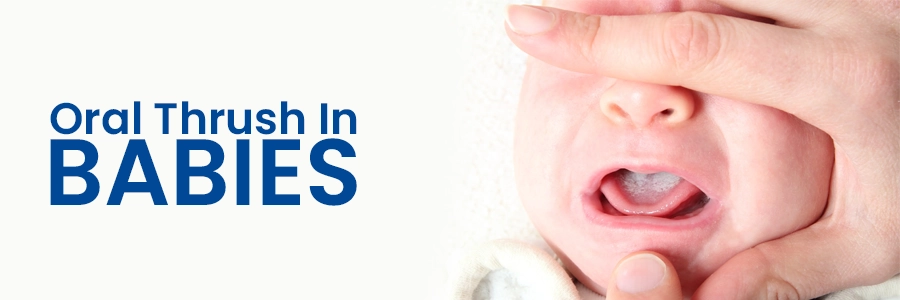- Cardiology 84
- Dermatology 45
- Endocrinology 33
- ENT 16
- Fertility 190
- Gastroenterology 78
- General-Medicine 81
- Gynecology 80
- Hematology 19
- Infectious-Diseases 33
- Neurology 52
- Oncology 34
- Ophthalmology 23
- Orthopedics 69
- Pediatrics 31
- Procedure 23
- Public-Health 144
- Pulmonology 59
- Radiology 8
- Urology 68
- Wellness 161
- Woman-and-child 77

Oral Thrush In Babies
A yeast called candida causes an infection called thrush. The common site for candida to cause infection is the mouth, which is called oral thrush. The vagina, nappy area, and nail folds are the other common sites for thrush to develop.
In about 1 in 7 babies, a bout of oral thrush develops at some point. A few of them suffer from recurrent bouts of oral thrush.
This infection is mainly observed in babies under 10 weeks of age and also in older ones. Oral thrush in infants is not caused by poor oral hygiene, and it typically does not indicate that your kid is ill in any other way.
Secure your health with a second opinion. Make informed decisions and book your appointment today!
Get A Second OpinionWhat Causes Oral Thrush in Babies?
- A few harmless Candida organisms are frequently found in a healthy mouth and on healthy skin.
- However, the overgrowth of candida in the mouth can cause oral thrush in babies.
- If the infant recently completed an antibiotic course, this could also be a reason why they may have oral thrush.
- The antibiotics have the potential to eradicate beneficial bacteria present in the mouth, which aids in reducing the amount of candida in a baby's mouth.
- If there are fewer beneficial bacteria, Candida overgrowth may occur.
- In addition, the healthy bacteria levels can be affected if the mother is breastfeeding and has recently been on antibiotics.
- This can make the mother and the baby more likely to develop thrush.
Symptoms of Oral Thrush in Babies:
- White spots or patches may combine to form more prominent, larger spots called plaques, which turn yellow or grey and resemble painful cottage cheese-like lesions (spots) in the baby's mouth and on the tongue.
- As a result, some infants may dribble saliva or fail to eat properly due to pain.
- If the mother is breastfeeding, there is a chance of the baby passing on thrush infection from their mouth to the mother's nipples which can be very painful.
- Cracked, painful, or occasionally red and glossy nipples are possible.
- If you suspect that you may have a nipple thrush infection, seek medical help.
- The doctor may suggest some cream to apply to the nipples to clear up the infection.
Treatment for Oral Thrush In Babies:
- Infants with mild episodes of oral thrush usuinally only experience symptoms for a few days or less and often resolve independently.
- If treatment is started, an anti-thrush gel medicine is usually prescribed by the Paediatrician.
- The gel is to be smeared using a clean finger onto the affected areas in your baby's mouth as prescribed by your Paediatrician.
- Instructions are to be followed carefully. The gel should be used after feeding the baby.
- Apply a little at a time, keeping it away from the back of the throat to reduce the minor chance of choking.
- The medication eliminates the candidal microbes that are present in the baby's mouth.
- Even after the thrush is cleared, the treatment prescribed by the Paediatrician should be continued for two days.
- If the thrush has not cleared after seven days, see your Paediatrician again.
Ready to take control of your health journey? Book your appointment now and start your path towards wellness today!
Book an AppointmentHow to Prevent Oral Thrush
There is no reason why most oral thrush attacks occur in infants. Some of the tips to prevent oral thrush episodes are:
- All dummies and mouth toys used by your baby should be regularly sterilized.
- If you bottle-feed, regularly sterilize all feeding equipment, especially teats.
Frequently Asked Questions
Oral thrush is a fungal infection in the mouth caused by yeast called Candida. It appears as white patches on the tongue and inside the cheeks.
Babies can get oral thrush from their mothers during childbirth, through breastfeeding, or from using pacifiers and bottles that are not properly cleaned.
Oral thrush itself is not contagious, but the yeast that causes it can be passed from person to person.
Yes, oral thrush can usually be treated with antifungal medications prescribed by a doctor.
Doctors diagnose oral thrush by examining the baby's mouth and sometimes by taking a swab of the affected area to test for yeast.
Yes, babies with oral thrush can usually continue breastfeeding. It's important to treat both the baby and mother if there are signs of infection.
With treatment, oral thrush in babies typically clears up within a week or two. It's essential to complete the full course of medication as prescribed.

- Cardiology 2132
- Dermatology 168
- Endocrinology 135
- ENT 97
- Fertility 217
- Gastroenterology 232
- General 478
- General-Medicine 1685
- Gynecology 169
- Hematology 85
- Infectious-Diseases 208
- Neurology 207
- Oncology 345
- Ophthalmology 65
- Orthopedics 187
- Pediatrics 83
- Procedure 72
- Public-Health 209
- Pulmonology 126
- Radiology 13
- Second Opinion 311
- Urology 294
- Wellness 600
- Woman-and-child 447
- Others 10217
Related Blogs
If you have any questions, please fill out the enquiry form or call us, and we will get back to you promptly.
040-68334455